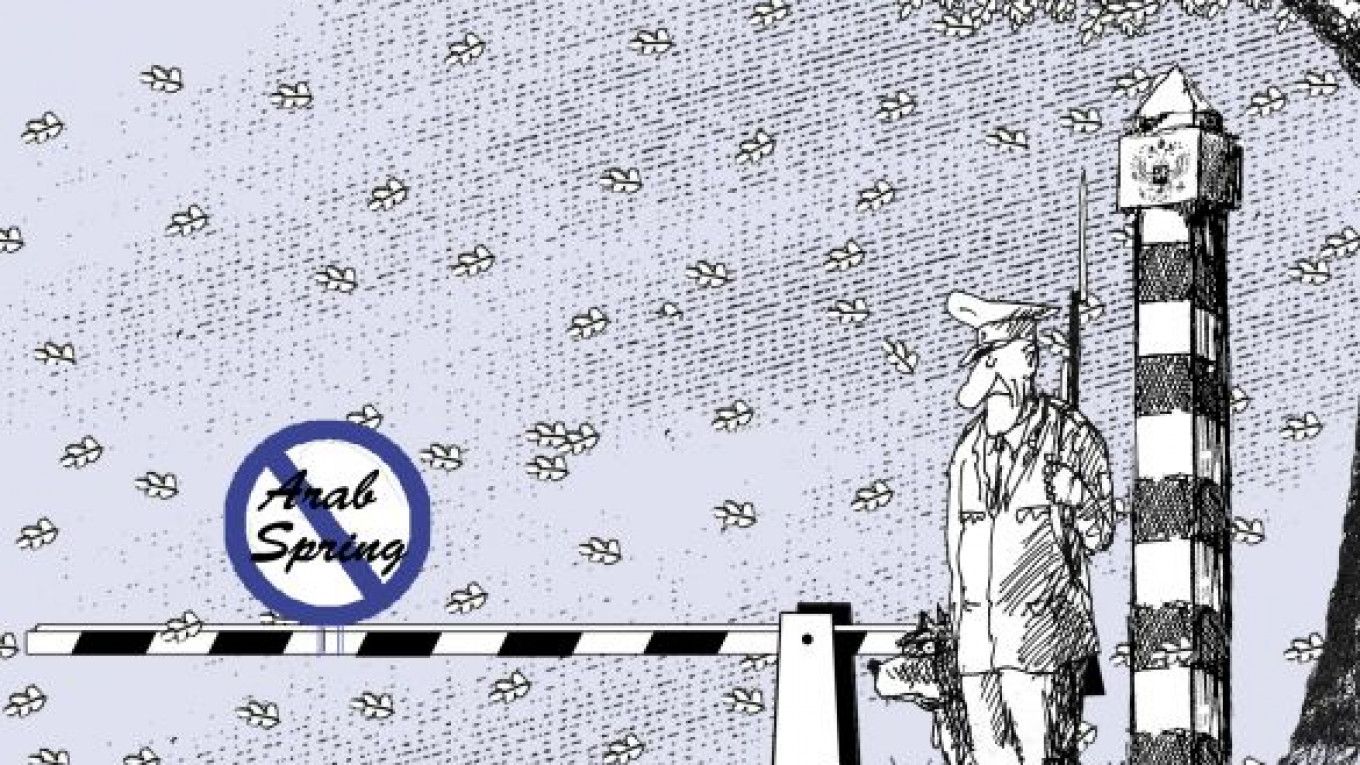After the downfall of longstanding authoritarian rulers in Tunisia and Egypt, President Dmitry Medvedev suggested that the Arab Spring was being fomented by the West to bring change to Russia itself.
While analysts generally dismiss the possibility that Russia could be affected by the wave of unrest against authoritarian regimes, many do take seriously the prospect of an Arab Spring-like movement spreading to the Caucasus — both North and South — as well as to Central Asia.
Leaving aside the question of whether this would be a good thing or not, what is the likelihood that this could happen?
It is highly unlikely, and there are three interrelated reasons for this: the limits of revolutionary contagion, the constraints of the international system and the limited expectations about the utility of revolution developed by those who have either experienced it or witnessed it at close hand.
What is especially fearful to those who oppose transnational revolutionary movements is that they can spread to other countries — especially with the help of those countries where it has succeeded. Indeed, several transnational revolutionary movements — including Marxist-Leninist, Arab nationalist, the 1989 anti-Communist revolutions across Eastern Europe, the color revolutions and now the Arab Spring — did spread to other countries.
But none of them succeeded in coming to power in as many countries as their proponents hoped or their opponents feared. Even the 1989 democratic revolutions that succeeded throughout Eastern Europe failed that same year in China.
The Arab Spring appears to be no exception. While it has succeeded in Tunisia, Egypt and Libya — and still may do so in Yemen and Syria — it has either been crushed, as in Bahrain, or failed to start in most other Arab countries and in non-Arab ones.
Indeed, it is somewhat surprising that the Arab Spring has apparently had no impact at all in Iran, where just two years ago a powerful democratic opposition movement arose that took the regime several months to crush. It would appear, then, that there are limits to how far revolutionary contagion can spread.
One reason for this is the constraints that the international system — particularly global and regional powers — put upon the spread of transnational revolutionary movements. As the late Fred Halliday of the London School of Economics and John Foran of the University of California at Santa Barbara have noted, revolution succeeds when permissive circumstances arise — not just in the country in question, but in the larger international system as a result of the major powers being weakened or distracted.
But once a certain type of revolution occurs, global and regional powers and their allies usually become energetically focused on preventing its further spread. Thus, Saudi Arabia, in particular, took active steps to suppress an Arab Spring revolution in Bahrain, Iran is now doing so in Syria, and Russia could certainly be expected to do so if such a movement arose anywhere in the Caucasus, in particular.
Finally, despite the success of a transnational revolutionary movement in one or more countries, it is unlikely to succeed, or even start up, in others where the people believe that it is likely to be suppressed in their country — and hence not worth attempting. Another possibility is that people may fear that the success of such revolution will not actually improve their situation and may even make it worse. The belief that it is better to have in power the “devil they know” can be strong when people believe that the next devil could be much worse.
While the perceived likelihood of suppression may be a more powerful deterrent to attempting them in the North Caucasus, the disappointing results of the earlier color revolutions in Georgia, Ukraine and Kyrgyzstan may well serve to dampen enthusiasm for Arab Spring-style revolutions in the South Caucasus as well as Central Asia. And if the Arab Spring revolutions themselves do not turn out well, which is a distinct possibility, this will further discourage attempting similar ones elsewhere.
What all this suggests, then, is that despite the hopes of some and the fears of others about the Arab Spring revolutions spreading to the Caucasus and Central Asia, this is not something that seems likely to occur, much less to succeed.
Mark N. Katz is a professor of government and politics at George Mason University.
A Message from The Moscow Times:
Dear readers,
We are facing unprecedented challenges. Russia's Prosecutor General's Office has designated The Moscow Times as an "undesirable" organization, criminalizing our work and putting our staff at risk of prosecution. This follows our earlier unjust labeling as a "foreign agent."
These actions are direct attempts to silence independent journalism in Russia. The authorities claim our work "discredits the decisions of the Russian leadership." We see things differently: we strive to provide accurate, unbiased reporting on Russia.
We, the journalists of The Moscow Times, refuse to be silenced. But to continue our work, we need your help.
Your support, no matter how small, makes a world of difference. If you can, please support us monthly starting from just $2. It's quick to set up, and every contribution makes a significant impact.
By supporting The Moscow Times, you're defending open, independent journalism in the face of repression. Thank you for standing with us.
Remind me later.






